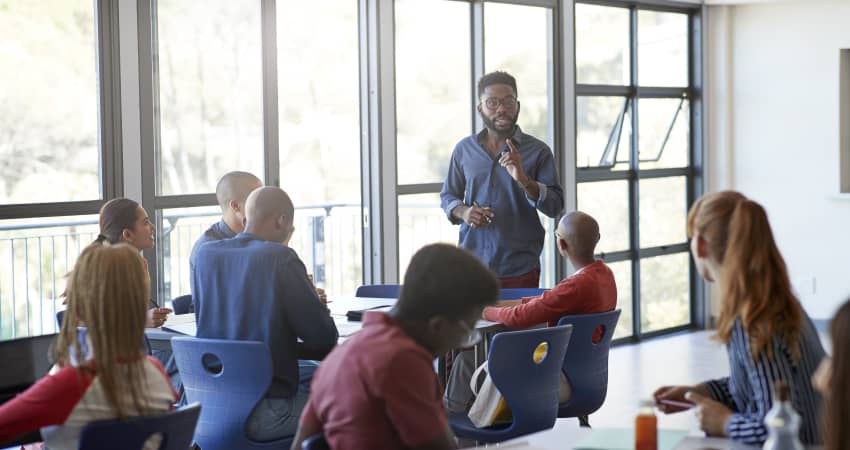Expert Q&A: The Value of an HBCU Education
Interview With Dr. Jason Wingard

What are the most unique aspects of an HBCU education?
While there are many laudable aspects of an education at historically black colleges and universities (HBCUs) — from the quality of the curriculum, to the strength in STEM fields, to providing access to education to those who may be barred from it for reasons both economic and systemic — I think the most unique aspect of an HBCU education is in it’s supportive environment.
While opportunities for advancing academically abound at many different kinds of institutions, students at HBCUs find a peer community with similar backgrounds and circumstances. Administrators, faculty, and staff at these institutions are specifically attuned to the needs of students, leading to a greater level of support for completing rigorous academic and societal requirements.
Additionally, there is significant power in the breadth and depth of professional network an HBCU provides students and alumni. Alumni associations at HBCUs are lauded for the strength of connection and opportunities they provide students well past graduation.
An HBCU education also includes a strong sense of community, which develops pride in black legacy in this country. Those connections are building blocks for professional success and essential for building up communities of color on campus and extending to the diverse world of work.

What are some common misconceptions about HBCUs?
One of the most common misconceptions I hear is that HBCUs are not academically rigorous. That is certainly not the case for the HBCUs that the Columbia University School of Professional Studies, the institution I lead as dean and serve as professor, has partnered with in our Columbia HBCU Fellowship program.
HBCUs, while representing less than 3% of colleges and universities in the country, graduate 42 percent of the nation’s African American engineers and 50% of all black professionals. Those accomplishments are not the results of a basis of academic lethargy.
What advice would you give to students considering applying to an HBCU?
Take advantage of the vast alumni network that comes hand-in-hand with the HBCU community. Those alumni are the key to navigating the working world and making connections that could yield dividends down the road in your job search.
Speak early and often with you academic advisors about post-graduate opportunities that exist to help you as you start your career. As with many programs of its ilk, the Columbia HBCU Fellowship relies on personal recommendations from universities about who to accept into its program.
Interview With Wesley Fondal Jr.

What were the most important factors in your decision to attend an HBCU?
Some of my most important factors in attending Dillard University and considering an HBCU was partly influenced by my high school experience. I attended a large, predominantly white high school and wanted a college that was a little more personable. I found Dillard to have a very good biology program as well. Financial assistance was also a very big factor. Dillard University gave me a good financial aid packet compared to some of the other schools I applied to at that time.
What are the most unique aspects of an HBCU education?
I think the family-like atmosphere that I experienced was a unique aspect for me. There was camaraderie among the student body. I think at most HBCUs, including Dillard University, my professors were easily accessible and willing to assist students in reaching their highest potential. At Dillard University, even the president of the university was accessible and knew most of the students by name. One of the unique aspects I found at Dillard were the many opportunities to lead and be in leadership roles.
What are some of the common misconceptions about HBCUs?
I feel that one of the most common misconceptions of HBCUs is that the quality of education is not as good as a predominantly white institution. HBCUs have consistently graduated students that are the top in their career fields.

What do HBCUs offer to students that other schools don’t?
HBCUs are known for their warm, friendly, homely atmosphere. I think this is extremely important to a population of students that may be first-generation college students. HBCUs offer a sense of belonging to their students that is inherent in their nature.
How has attending an HBCU impacted your post-college life? Have you taken advantage of the alumni network?
Attending Dillard University gave me confidence in graduate school that I could succeed. More importantly, I look back now at my experience and education at an HBCU and realize that it has shaped a big part of how I lead today. It is always good to go back and visit and always encouraging to meet fellow alums at home and when I travel.
Alumni Perspectives: HBCU Edition
We sat down with a couple HBCU alumni, Brittany Dunlap and Jason Streeter, to learn about their experiences attending an HBCU and how their universities prepared them for life after graduation. Through their perspectives, we gained more insight into the importance of HBCUs.